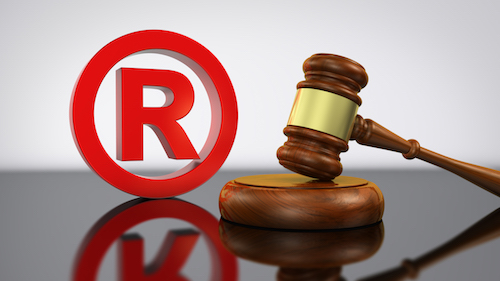“The Supreme Court will issue its ruling in the TRUMP TOO SMALL case [next year] just in time for the political battles to start heating up.”
 This year has seen a bonanza of significant trademark decisions, including several high- profile decisions from the Supreme Court. Courts ruled on issues ranging from First Amendment and parody considerations to the extraterritorial reach of U.S. trademark law, yet in most cases returned to basic principles of trademark law to resolve the open issues. Below is a selection of a few of those significant cases from the previous year.
This year has seen a bonanza of significant trademark decisions, including several high- profile decisions from the Supreme Court. Courts ruled on issues ranging from First Amendment and parody considerations to the extraterritorial reach of U.S. trademark law, yet in most cases returned to basic principles of trademark law to resolve the open issues. Below is a selection of a few of those significant cases from the previous year.
NFTs
The year began with a much-anticipated jury trial in Hermes Int’l et al. v. Rothschild (1:22-cv-00384) (SDNY Jan. 14, 2022), in which a federal jury in New York returned a verdict in favor of luxury brand Hermès International SA in the “MetaBirkin” nonfungible token (“NFT”) case. Hermès had sued digital artist Mason Rothschild for trademark infringement of the “Birkin” trademark after Rothschild had created digital images depicting different variations of Hermès’ Birkin luxury bag and then sold 100 of these NFTs in 2021. Hermès argued that this was a “get rich quick” scheme by a “digital speculator”, and Rothschild was misappropriating the goodwill in Hermès’ famous intellectual property to create and sell his own line of products. Legal observers had eagerly awaited the outcome of the case as it was one of the first to delve into the intersection of trademark law and the virtual universe. The jury sided solidly with Hermès on the issues of trademark infringement, dilution, and cybersquatting, awarding damages of $133,000. The decision, which is currently being appealed to the Second Circuit, emphasized the importance of the core trademark concept of avoiding consumer confusion, even when there may also be artistic messages at play. The decision also gave comfort to brand owners that their trademarks should be enforceable in the virtual NFT landscape.
Parody
The Supreme Court continued this focus on core trademark concepts in Jack Daniel’s Properties Inc. v. VIP Products LLC, (599 U.S. 140) (2023). Billed as a battle between First Amendment protections and trademark rights, the case ended up memorializing the primacy of protecting consumers from confusion and the traditional likelihood of confusion analysis. The case involved a dog toy sold by VIP Products, LLC that parodied the Jack Daniel’s whiskey bottle. The dog toy replaced the “Jack Daniels” trademark with the phrase “Bad Spaniels”, and changed other images and text on the plush toy bottle to play on the concept of a dog having an “accident” on the floor (for example, “40% alcohol by volume was changed to “43% poo by vol.”). VIP Products had argued that its toy was simply a parody, which gave it a defense from trademark infringement under the First Amendment. VIP Products argued (and the Ninth Circuit had agreed), that the case implicated the test in Rogers v. Grimaldi test for trademark infringement – i.e., that a heightened standard should be applied where trademark use served an artistic or expressive purpose. The Supreme Court disagreed, finding that this situation “falls within the heartland of trademark law”, and finding that the Rogers test had no proper role where the allegedly infringing trademark use was at least in part for source identification. In those cases, the traditional likelihood of confusion analysis is the appropriate test. The Court also disposed of VIP Products’ fair use defenses to the dilution claims, finding that the fair use exception does not apply when the junior user’s use is “a designation of source for the person’s own goods or services.” The outcome of the case should be a comfort to brand owners in the United States – especially owners of iconic brands who are more likely to be parodied – as it more clearly defined the boundary between parody and infringement and strengthened the ability of those owners to assert their rights even when some parody elements are present. The Court also diminished the significance of the Rogers test as a “cabined doctrine”, which “has not insulated from ordinary trademark scrutiny the use of trademarks as trademarks.”
First Amendment
Humorous content and the First Amendment continued their presence at the Supreme Court in Vidal v. Elster (Docket No. 22-704). While the case was argued on November 1, 2023 and a decision has not yet been issued, the line of questioning from the Court strongly suggests a decision in favor of the U.S. Patent and Trademark Office (USPTO). Respondent Steve Elster had attempted to register the phrase “TRUMP TOO SMALL” for use on various types of clothing. The USPTO had refused registration of the phrase on grounds that it identified a living individual without their consent, and on grounds that it falsely suggested a connection with living or dead persons. After the Trademark Trial and Appeal Board affirmed the refusal, the Federal Circuit reversed, finding that the refusal was improper because the decision would unfairly restrict an applicant’s First Amendment right to criticize government officials and public figures. The case has been seen by many as the next iteration in a string of recent cases striking down traditional limits against registration of various kinds of marks, including Matal v. Tam (582 U.S. 218) (2017) (striking down the ban against racist trademarks) and Iancu v. Brunetti (588 U.S. __) (2019) (striking down the ban against profane or lewd material). Questioning focused on how Elster was claiming his First Amendment rights were violated, with several justices pointing out that the government was only refusing his right to register the phrase as a trademark, and that he could presumably sell as many shirts as he wanted. As in several other cases this year, the discussion turned to the core functions of a trademark, and especially trademark registrations. The focus of the Justices’ questioning suggests that this may not be another landmark trademark case involving the First Amendment, but we will see when the Court issues its formal ruling.
Extraterritoriality
In yet another Supreme Court trademark ruling this year, the Court addressed the longstanding presumption against extraterritoriality in Abitron Austria GmbH v. Hetronic International Inc. (600 US 412) (2023). The concept of extraterritoriality provides that U.S. statutes typically are not applicable against foreign activity. In this case, the brand owner Hetronic had sued its former licensing partner in Europe for sales that continued after the trademark license had lapsed. Because a small amount of sales did occur in the United States, the lower courts had awarded a judgment of $96 million to Hetronic, even though the majority of those sales had occurred abroad. In a decision that was unanimous in favor of Abitron but divided in terms of reasoning, the Court reversed the decision, limiting the extraterritorial application of federal trademark law. Again the Court went back to the roots of trademark law, ruling that dividing line between foreign and domestic applications of trademark law is found in the concept of “use in commerce” – i.e., commerce that can be regulated by Congress. The decision is unlikely to have major ramifications on how companies enforce their trademark rights, but it did send a clear message to brand owners to ensure that they have a well-thought-out approach to their international brand protection and enforcement. Now that the Supreme Court has more clearly drawn the line on extraterritoriality, brand owners can seek additional protection in countries where they license their marks or otherwise do business.
What to Watch in 2024
This year saw significant decisions in the trademark world at the highest levels, and next year should see no shortage of interesting trademark cases. The Supreme Court will issue its ruling in the TRUMP TOO SMALL case just in time for the political battles to start heating up. In the social media arena, “X” (formerly Twitter) will continue its battle against X Social Media LLC in a trademark infringement case currently pending in district court in Florida. An ongoing battle between Charles Bertini and Apple, Inc. at the Trademark Trial and Appeal Board (TTAB) over Bertini’s APPLE JAZZ and Apple’s APPLE MUSIC trademarks has been pending for years, and could shed light on the obligation of the USPTO to issue timely rulings in its cases. In 2023, the TTAB dismissed an opposition by law professor Rebecca Curtin over the right of United Trademark Holdings Inc. to register the term RAPUNZEL. The case, which has been pending for five years, was dismissed on the grounds that Curtin lacked entitlement to a statutory cause of action, and has been appealed to the Federal Circuit for decision next year. Keep an eye out for decisions in these cases in the upcoming year.
Image Source: Deposit Photos
Author: NiroDesign
Image ID: 188971134

![[IPWatchdog Logo]](https://ipwatchdog.com/wp-content/themes/IPWatchdog%20-%202023/assets/images/temp/logo-small@2x.png)

![[Advertisement]](https://ipwatchdog.com/wp-content/uploads/2024/04/UnitedLex-May-2-2024-sidebar-700x500-1.jpg)
![[Advertisement]](https://ipwatchdog.com/wp-content/uploads/2024/05/Quartz-IP-May-9-2024-sidebar-700x500-1.jpg)
![[Advertisement]](https://ipwatchdog.com/wp-content/uploads/2024/04/Patent-Litigation-Masters-2024-sidebar-700x500-1.jpg)

![[Advertisement]](https://ipwatchdog.com/wp-content/uploads/2021/12/WEBINAR-336-x-280-px.png)
![[Advertisement]](https://ipwatchdog.com/wp-content/uploads/2021/12/2021-Patent-Practice-on-Demand-recorded-Feb-2021-336-x-280.jpg)
![[Advertisement]](https://ipwatchdog.com/wp-content/uploads/2021/12/Ad-4-The-Invent-Patent-System™.png)







Join the Discussion
No comments yet.